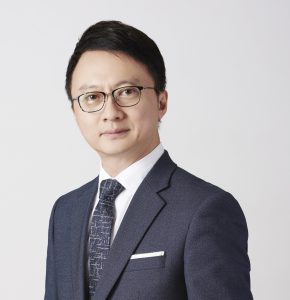
A Leader in Research, a Mentor and a Humanitarian
The College is pleased to present the International Leadership Award to Professor Francis Ka-Leung Chan, MD, FACG. For the past 20 years, Professor Chan has made extraordinary contributions to international gastroenterology. He has used research to inform revisions to national and international practice guidelines, nurtured leaders in the field, led patient care improvements in the Asia-Pacific region, and participated in humanitarian efforts.
Professor Chan’s research has focused on improving the care of patients on NSAIDs and anti-platelet drugs who are at high risk of gastrointestinal bleeding. A colleague in the GI community referred to his endoscopic clinical trials as the “gold standard.” He has published more than 500 scientific papers, including in leading medical journals such as The American Journal of Gastroenterology (AJG), The New England Journal of Medicine and The Lancet, and has contributed to major revisions to national and international clinical management guidelines. He has served as an associate editor or editorial board member to multiple journals, including AJG.
Professor Chan has had an active role in shaping leaders in gastroenterology within and outside of his home of Hong Kong. Nine young fellows from across Asia and Europe whom Professor Chan supervised have taken leadership positions in their respective institutions in the last 15 years.
In 2011, Professor Chan established an Asia-Pacific multidisciplinary panel on the management of patients on NSAIDs and anti-platelets to review and update current guidelines and standards of care, in order to improve the care of these high-risk patients in many developing Asian countries.
In 2016, the Asian Pacific Association of Gastroenterology and the Asian Pacific Society for Digestive Endoscopy jointly appointed Professor Chan as convenor of a conjoint working panel on management of patients on anti-thrombotics undergoing GI endoscopy. Many Asian countries and professional societies have widely adopted recommendations in the panel’s reports.
Professor Chan has provided voluntary health service to institutionalized, mentally handicapped children for more than 10 years. During the SARS outbreak in Hong Kong in 2003, Professor Chan organized a large-scale, free screening program to detect silent SARS infection for Hong Kong citizens. In addition, he led a colorectal cancer screening program for those of lower socioeconomic status. In recognition of his contributions to society, the Hong Kong Government conferred upon him the honor of Justice of Peace in 2011.
Professor Chan obtained a Bachelor of Medicine and Bachelor of Surgery (MB ChB) with honors from The Chinese University of Hong Kong (CUHK) in 1988. In 1998 and in 2011, he received the Doctor of Medicine and the Doctor of Science respectively from CUHK. In recognition of his outstanding scholarship, he has been conferred the title of Choh-Ming Li Professor of Medicine and Therapeutics of CUHK. He also serves as a Board Member of the Hong Kong Hospital Authority.
Professor Chan joined CUHK as a lecturer in 1997. He was promoted to Professor of Medicine in 2005. An outstanding teacher, he was voted Teacher of the Year by students five years in a row and received the Vice-Chancellor’s Exemplary Teaching Award in 2000 and 2007. In 2010, he was appointed Director of the Institute of Digestive Disease of CUHK, and the Specialty Board Chairman of Gastroenterology & Hepatology in Hong Kong. In January 2013, he was appointed as the Dean of the Faculty of Medicine in CUHK.
He has been conferred many national and international honors and awards. He gave the David Y. Graham Lecture at the 2005 ACG Annual Scientific Meeting.
ABOUT THE INTERNATIONAL LEADERSHIP AWARD
The International Leadership Award is given to a Fellow or Master of the ACG in recognition of outstanding and substantial contributions to gastroenterology, to the College and to the international gastroenterology community. Substantial contributions internationally may include, but are not limited to the following: The training of individuals from other countries who have gone on to become leaders in gastroenterology in their community; leadership in international organizations that has resulted in improvement in the care of patients; and participation in humanitarian efforts.

